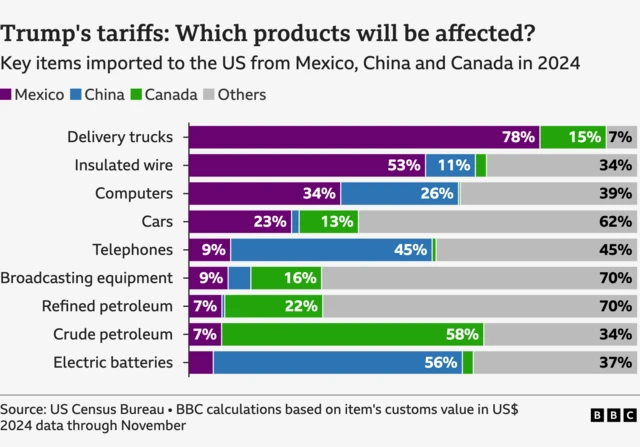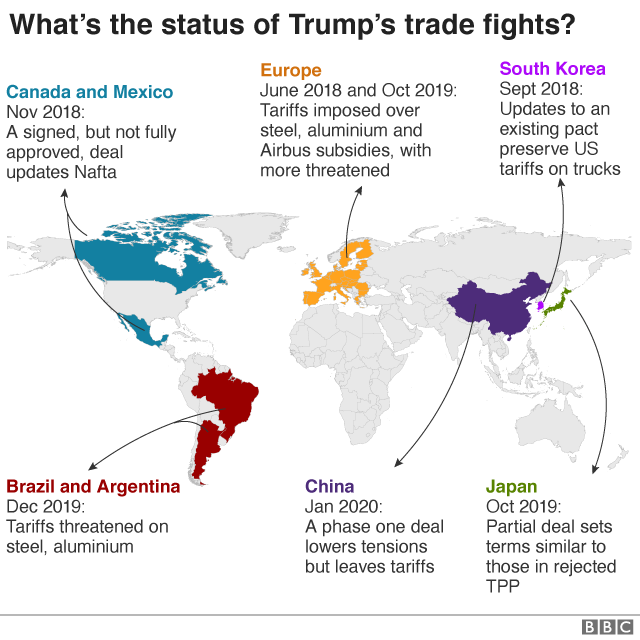In recent times, US package tariffs have become a hotly debated topic, especially in light of the Trump administration tariffs that have significantly altered trade dynamics. As of August 29, the rules governing package shipping to the US will shift dramatically, with the de minimis exemption being lowered from $800 to just $100. This change is causing international shipping delays, as global postal services like Germany’s Deutsche Post and Singapore’s SingPost are reconsidering their operations in light of these tariffs. The immediate consequences are creating anxiety among consumers eagerly awaiting gifts and purchases from abroad. With millions of packages expected to be impacted, the future of international shipping to the US hangs in the balance, raising questions about accessibility and economic implications for everyday Americans.
The conversation around tariffs on packages entering the United States is essential now more than ever. With recent policy updates reflecting the Trump administration’s approach to trade, the landscape of international commerce is rapidly evolving. Significant shifts, like the de minimis exemption threshold, could reshape how consumers access goods from overseas. In response to these changes, various postal services across the globe have started to pause their shipments to the US, highlighting concerns over logistics and compliance. As this situation unfolds, understanding the intricacies of these tariffs will be crucial for consumers and businesses alike, particularly as they navigate the challenges of sending and receiving packages across international borders.
Understanding US Package Tariffs and Their Impact
US package tariffs have become a critical topic in international shipping, particularly due to changes introduced by the Trump administration. The new regulations, which aim to lower the de minimis exemption threshold from $800 to $100, have created a busy landscape of compliance and confusion. With many countries opting to halt their package shipments to the US, the implications for consumers and businesses are significant. Individuals relying on international shipping for gifts or essential goods now encounter longer wait times and potential financial burdens due to tariffs on packages above the new threshold.
This unexpected shift in US package tariffs is not only affecting shipping timelines but also the global postal services that facilitate these transactions. Countries such as Korea, Austria, and Finland have suspended their services, causing frustration among consumers who anticipate their deliveries. The uncertainty about how tariffs will be applied and communicated further exacerbates the situation, leaving postal services grappling with policies that could not only disrupt shipping but also deter them from engaging in future transactions with US clients.
The De Minimis Exemption: What You Need to Know
The de minimis exemption has historically provided a significant advantage to international shoppers in the United States by allowing packages valued below $800 to enter the country without incurring tariffs. However, the Trump administration’s recent decision to reduce this exemption level to $100 threatens to change the shopping landscape dramatically. This adjustment will not only increase the financial burden on consumers who purchase overseas but will also impact the variety and affordability of international goods available to American shoppers.
As the de minimis exemption negotiations continue, it’s essential for consumers to understand how this policy shift could affect their purchasing decisions. With many postal services around the world halting shipments to the US, the once-simple task of buying a gift or other item from abroad may now involve additional costs and complicated regulations. Additionally, the National Bureau of Economic Research has indicated that lower-income households could experience a disproportionate impact, emphasizing the broader economic ramifications that could follow if the new tariff policies are enforced.
International Shipping Delays During Tariff Changes
International shipping delays have become increasingly common as countries grapple with the uncertainties surrounding the new US package tariffs. Postal services from nations like Australia, the UK, and Germany have recently announced temporary suspensions, aiming to avoid complications in processing and delivering packages stateside. These delays reflect the logistical challenges posed by sudden policy changes, which have left shipping companies uncertain about how to navigate the new tariffs and their implications on package fulfillment.
As these shipping unions temporarily withdraw their services, affected consumers are left in limbo. What was once a straightforward online shopping experience now involves navigating a maze of changing regulations, customs duties, and the potential for increased shipping costs. Businesses that depend on international shipping face challenges not just in fulfilling online orders but also in maintaining customer satisfaction during this transitional period. As the global community continues to respond to the US’s shifting shipping landscape, the hope remains that clarity and consistency will eventually return to international trade.
Global Postal Services Respond to US Tariff Changes
The recent shift in US package tariffs has prompted a significant reaction from global postal services, many of whom have temporarily suspended operations to the United States. Countries like Norway and Belgium are halting their shipments, while others seek clarity on how to manage the new tariff structure effectively. This drastic action demonstrates the international community’s frustration with the unpredictability stemming from the Trump’s administration’s policies, which seem to be resulting in widespread confusion and operational challenges.
With the changes in the de minimis exemption affecting hundreds of thousands of packages daily, many postal organizations are left uncertain about how to process incoming deliveries. This has raised concerns about the reliability of international shipping for US consumers and the possibility of ongoing shipping disruptions. The result is a compounded impact on global e-commerce, as postal services must navigate the murky waters of new tariffs while attempting to restore normalcy to their operations.
Economic Ramifications of Changing the De Minimis Threshold
Shifting the de minimis threshold from $800 to $100 could unleash profound economic ramifications for US consumers and international suppliers alike. Research indicates that this change threatens to increase the average tariffs on lower-income Americans significantly, raising their costs of goods and diminish purchasing power. The National Bureau of Economic Research reports a projected decrease in consumer welfare that could range between $11 billion and $13 billion annually, effectively crippling the budgets of households that already struggle.
Moreover, the unnecessary financial burden placed on low-income ZIP codes stands in contrast to wealthier areas where the impact may be less pronounced. The economic inequality exacerbated by this policy reflects a growing concern that international shipping and tax policies require more thoughtful consideration, particularly regarding how they affect both consumers and businesses on different economic tiers. As the landscape of package shipping to the US evolves, it’s critical to evaluate how these tariffs will shape the broader economy.
Long-Term Consequences of Tariff Policies on Shopping Behaviors
The long-term consequences of the Trump administration’s tariff policies may reshape shopping behaviors among American consumers. With increased tariffs on packages exceeding the de minimis threshold, many consumers may opt to seek local alternatives or avoid international purchases altogether. This shift in purchasing habits could ultimately result in reduced access to a diverse array of products, diminishing the competitive advantage that international e-commerce has provided in recent years.
As consumers reassess their shopping strategies, businesses engaged in international trade will also have to adapt to new realities. The potential decrease in demand for foreign goods could lead to economic shifts and competition adjustments among domestic and international suppliers. Additionally, this changing landscape requires businesses to stay informed about tariff updates and compliance demands to avoid consequences that could further impact their bottom line.
Navigating the Confusion of Package Shipping to the US
Navigating the confusion of package shipping to the US has become a daunting task for consumers and businesses alike. With many international postal services pausing operations and uncertainties surrounding tariffs, shoppers may find themselves in a state of frustration, unsure of when or if their packages will arrive. It is essential for consumers to stay abreast of developments regarding US tariffs and de minimis exemptions to ensure they make informed purchasing decisions from overseas.
For businesses, particularly those relying on cross-border e-commerce, adapting to these new challenges will be paramount. Establishing strong relationships with reliable shipping partners and maintaining an understanding of tariffs and shipping regulations will become essential strategies. By doing so, they can minimize disruptions in service and continue to meet customer demands in an increasingly complex international shipping environment.
Key Considerations for Consumers Facing Tariff Changes
For consumers navigating a post-tariff shopping landscape, there are several key considerations to keep in mind. First, understanding how the de minimis threshold change affects purchasing decisions is vital; consumers may have to factor in additional costs or consider opting for less expensive items to avoid tariffs. Monitoring whether packages qualify for the exemption will require attention, ensuring that purchases remain within the new limits set forth by the government.
Additionally, consumers must be aware of current international shipping delays caused by the uncertainty surrounding tariffs. Staying informed about the status of their packages, understanding the potential for shipping restrictions from various countries, and re-evaluating the urgency of their purchases can help mitigate the frustration and confusion resultant from these changes. Ultimately, being proactive and adaptable in this transitional time will empower consumers as they navigate the shifting landscape of international retail.
Future Implications of US Tariff Policies on Global Trade
The future implications of US tariff policies are set to resonate across global trade networks, significantly influencing how countries engage in commerce. As the Trump administration’s tariffs evolve, nations may reassess their relationship with the US, weighing the economic benefits against the complexities these policies introduce. If the current trends persist, it could lead to a more fragmented global trade environment, where countries favor partnerships with less complex tariff regulations.
Additionally, as taxation on imported goods becomes more stringent, the adjustment period may lead to renegotiations in trade agreements and a call for more transparent and equitable practices in commerce. Ultimately, the success of international relations and trade will depend heavily on how well the involved parties can navigate the new realities introduced by shifts in US tariff policies.
Frequently Asked Questions
What are US package tariffs and how do they affect international shipping?
US package tariffs are taxes imposed on packages entering the United States from foreign countries. These tariffs can affect international shipping by increasing costs for consumers and delaying delivery of packages. Under recent changes to the tariff policy, packages valued over $100 will incur customs duties, complicating package shipping to the US.
How are Trump administration tariffs impacting the de minimis exemption for packages?
The Trump administration has made significant changes to the de minimis exemption, which previously allowed packages valued at up to $800 to enter the US duty-free. The new threshold is now set at $100, meaning packages exceeding this value will be subject to tariffs, impacting many international shipments to the US.
What are international shipping delays related to US package tariffs?
International shipping delays related to US package tariffs are occurring due to confusion and uncertainty surrounding the new tariff guidelines. Many global postal services have paused deliveries to the US rather than deal with the complexities of the tariff regime, leading to significant delays for consumers waiting for packages.
Why are global postal services halting package shipping to the US?
Global postal services are halting package shipping to the US primarily due to uncertainty surrounding the Trump administration’s new tariff policy. With the de minimis exemption lowered, postal services from countries like Korea and Austria are suspending their shipments to avoid complications with customs and tariffs.
What is the potential economic impact of eliminating the de minimis exemption on low-income Americans?
Eliminating the de minimis exemption may significantly impact low-income Americans, as research indicates that the average tariffs faced in poorer ZIP codes could rise to about 12%. This change could diminish consumer welfare by an estimated $11 to $13 billion annually, disproportionately affecting those in lower-income brackets.
How can consumers mitigate the effects of US package tariffs on their international shipments?
Consumers can mitigate the effects of US package tariffs by considering purchase prices and perhaps opting for items that are below the new $100 de minimis exemption threshold. Additionally, they can explore local alternatives or shop from domestic retailers to avoid international shipping delays and tariffs.
What should I know about package shipping to the US amidst changes in tariffs?
When shipping packages to the US, be aware of the new tariff thresholds and the potential for increased fees on packages valued over $100. Monitor shipping updates from your postal service, and consider the possibility of delays due to many countries suspending shipments to the US in response to the tariff changes.
How are US package tariffs going to be enforced under the new regulations?
The enforcement of US package tariffs under the new regulations will require countries to provide accurate information to US authorities regarding package values. However, uncertainties remain about the collection process, heightening concerns among international shipping companies about compliance and delays.
| Key Point | Details |
|---|---|
| De Minimis Exemption | Allows packages valued up to $800 to enter the US duty-free. |
| Policy Change | Trump administration has proposed reducing the exemption threshold to $100. |
| Impact on Shipping | Global postal services are suspending shipments to the US due to uncertainty over tariff collection. |
| Countries Affected | Korea, Singapore, Austria, Norway, Finland, Germany, Czech Republic, and others halting packages to US. |
| Economic Impact | Low-income Americans will face higher tariffs, estimating a cost to consumer welfare between $11 billion and $13 billion annually. |
Summary
US package tariffs are undergoing significant changes with the proposed elimination of the de minimis exemption, which has allowed packages valued up to $800 to enter the country duty-free. This new policy reduces the exemption threshold to $100, potentially increasing costs for consumers and leading to global postal services delaying shipments to the US. The anticipated consequences may disproportionately affect low-income communities and diminish consumer welfare substantially.



